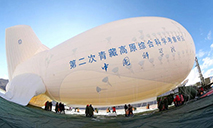Young Chinese making dreams come true on Belt and Road
BEIJING, May 16 (Xinhua) -- Holding fast to their dreams and rising to face challenges, young Chinese people have left an indelible mark through their work in support of people's well-being in Belt and Road countries.
With diligence and perseverance, they have advanced projects with big implications for relevant countries in the fields of infrastructure construction and health care, shared skills with coworkers, and made friends with local people.
DOWN-TO-EARTH SOLUTIONS
Born in 1994, Zhou Lin joined the China Railway Major Bridge Engineering Group straight after graduating from university. He has worked for years on the Padma Multipurpose Bridge project in Bangladesh, a bridge that could shorten the trip between the country's capital and its 21 southwestern regions to 10 minutes from seven to eight hours upon completion.
The young man does not talk much, but he is not afraid of making innovations, and through years of hard work he has become the deputy manager of the project's engineering department.
Located in an area with complicated geological conditions, the project has brought multiple challenges to Zhou Lin and his colleagues, requiring the adaptation of a number of original technologies in the world.
At first, he would turn to the head of the engineering department for advice when encountering difficulties. As time passed, however, he learned to solve problems based on research before reaching out to senior engineers.
"I still remember the time when I designed a lifting beam and made calculations partly based on data from an online reference book. When I showed the calculations to a senior engineer, he asked me to clarify the source of each data point and not to take the risk of using wrong references," Zhou Lin recalled. "I really learned a lesson that day. From then on, I never forgot to verify details."
Engineering staff on the project wrote suggestions to optimize construction procedures on a regular basis, and the project leader revised the suggestions word by word. "Each time, I would carefully compare the revisions and my original version, and reflect on how to improve in terms of logic and expressions," he added.
His inquiring mind has guided him in making various technical breakthroughs. So far, he has participated in the application of seven patents, three of which have already been licensed in China.
As a mentor to two engineers who joined the company in 2017 and 2019, Zhou Lin has also passed on the wisdom and prudence of Chinese engineering to younger Belt and Road builders.
"While on site, we often need to make temporary designs for architectural structures. I think the younger engineers can learn more by doing it independently. So I usually make a sketch and explain the structure before assigning the work, and then I check their progress frequently," he said.
The bridge is located above a river with banks founded on loose soil. Heavy downpours in the rainy season often caused flooding, making the staff accommodation and construction facilities at risk of serious damage.
Not long after Zhou Lin started his work on the project, the area was lashed by days of torrential rain, with the river rising to a dangerous level.
At this critical time, he was among the first to join the flood-relief team. In the face of rolling waves in one of the biggest three rivers in Bangladesh, he worked side by side with team members, establishing effective procedures to prevent flooding with sandbags.
After years in Bangladesh, his face is now deeply tanned, and he is more than happy to remain in the country. "The local people are very friendly to the Chinese, and they often take us shopping or tasting local flavors in our spare time," he smiled.
Zhou Lin also likes to share what he has learned on the project with young Bangladeshi technical staff, and discuss technical problems with them to help train the local engineering talent.
"My dream is to become an expert in bridge building, and I'm glad to do something to improve the infrastructure in Belt and Road countries," he said. "Our project brings benefits to local transportation, economic growth and the training of engineers."
According to Mostak Ahamed Galib, executive director of the cross-cultural communication and Belt and Road Initiative research center at Wuhan University of Technology, the Padma bridge project will bring great benefits to Bangladesh in the coming years.
"The bridge is considered a 'bridge of hope' in Bangladesh. Its opening is expected to drive an increase of the country's annual GDP by 1.5 percent and bring new opportunities to the youth in 21 southwestern regions of the country," said Galib.
Hailing the contribution of young Chinese people to the construction of the bridge, Galib said, "Chinese youth in the new era have set a role model for the over 50 million young people in Bangladesh in jointly creating a better future for humanity."
PANDEMIC BATTLE
Since the COVID-19 outbreak in 2020, Zhou Jie, a 29-year-old diagnostic application engineer with Sansure Biotech Inc., has visited 10 countries, spending about one-third of his time working overseas.
He is among the 200 young technical experts with Sansure Biotech who have worked overseas on the anti-pandemic front line.
Visiting various Belt and Road countries, they have assisted local people in setting up nucleic acid testing and pandemic control systems, built hundreds of laboratories and trained thousands of testing staffers on-site or online.
"Our routine is to visit high-risk places such as laboratories and hospitals," said Zhou Jie. "We often found ourselves missing mealtimes, but we never hesitated. Even with their face screens on, you can see the determination in the eyes of the young people."
He recalled a time when his team helped a laboratory in Saudi Arabia remove contaminants. "Upon receiving the client's inquiry about inaccurate testing results, we checked their experiment data and found that most of the false results occurred after a certain day. So we conducted environmental monitoring at the laboratory and realized that the contamination was due to inappropriate operation."
"We explained the principle and purpose of each step to the local staff, while removing the contaminants, to help them better understand the operational procedures," he said.
As international travel was seriously disrupted by the pandemic, Zhou Jie and his colleagues had to replace on-site equipment installation and user training with a range of services online. To overcome jetlag and language problems, they created videos and instructions in multiple languages, offering around-the-clock assistance to clients.
Zhou Jie is determined to establish Chinese medical diagnostic products as the international benchmark.
"I believe the youth are the most active and vibrant people in society, and we have the power to change the world," he said. Enditem
(Ye Ting also contributed to the story.)
Photos
Related Stories
- Interview: BRI delivers mutual benefits, says Italian expert
- China's BRI projects greatly benefit Cambodian economy, people: officials, experts
- China's BRI projects greatly benefit Cambodian economy, people: officials, experts
- China's Belt and Road Initiative symbol of global cooperation, says U.S. scholar
- New book on China by renowned British sociologist published
Copyright © 2022 People's Daily Online. All Rights Reserved.










